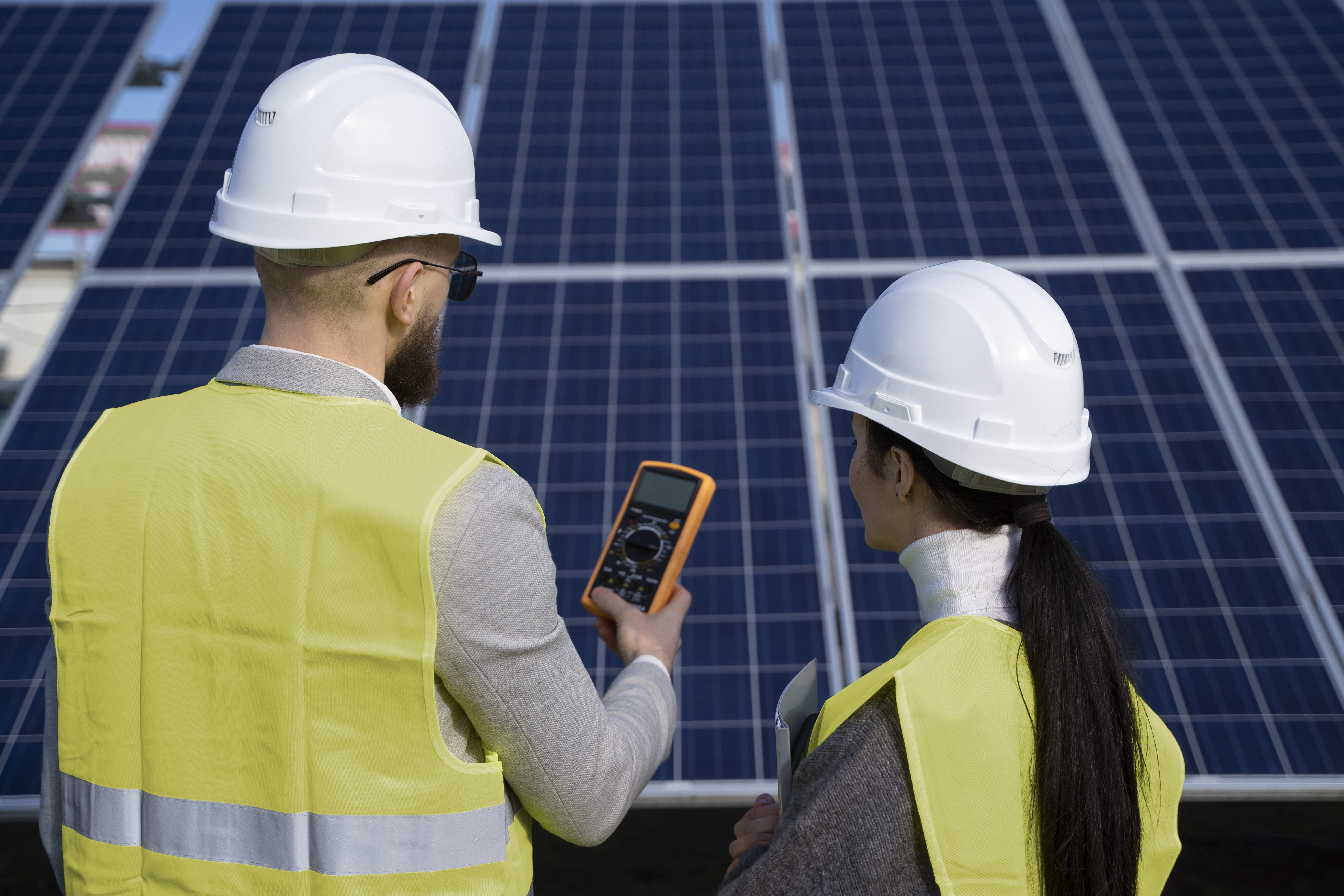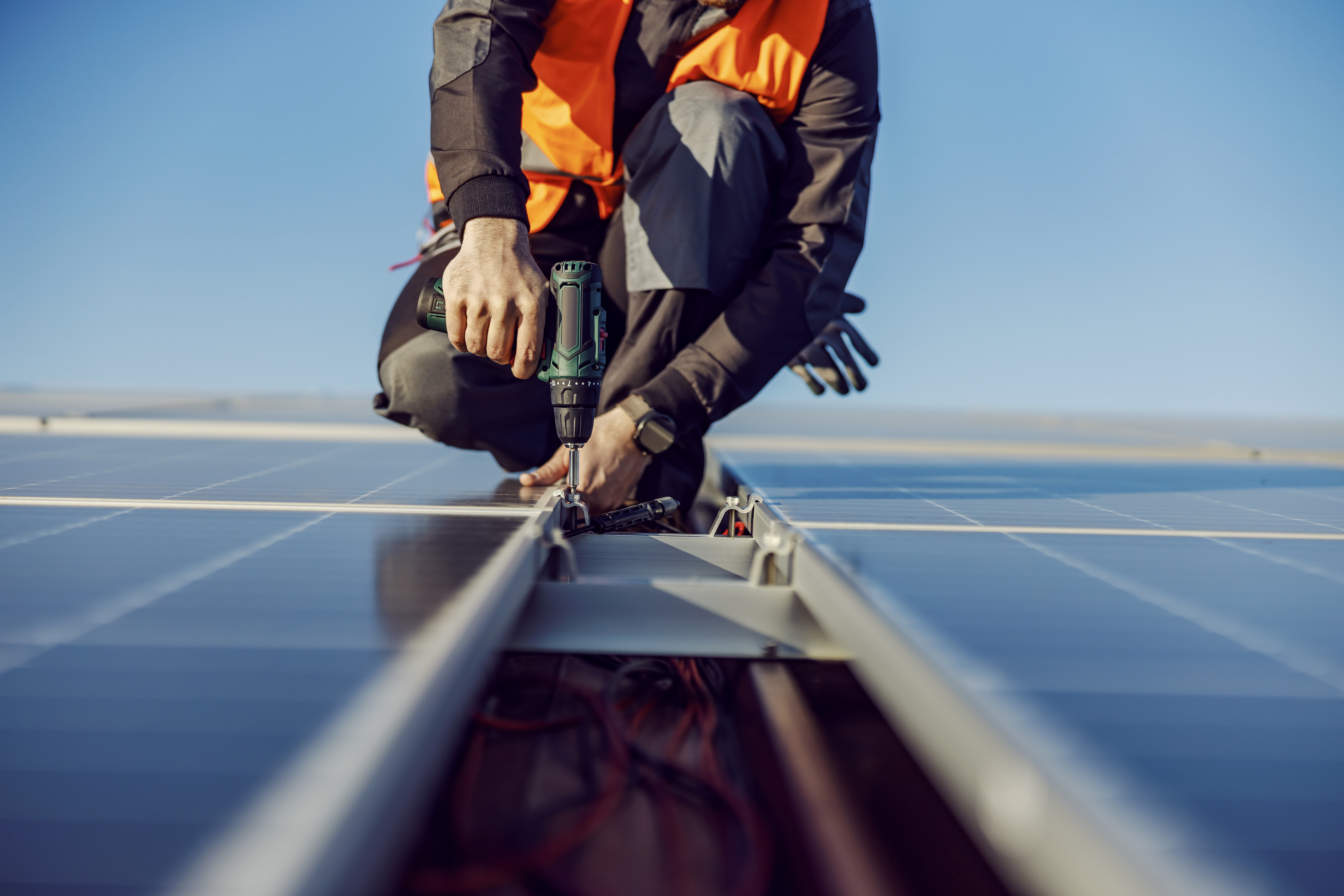Solar Panels:
Solutions for maximum energy savings
What are solar panels?
Solar panels convert sunlight into electricity or heat, offering renewable energy for homes and businesses. They reduce carbon emissions and energy bills by decreasing reliance on fossil fuels for electricity and heat. There are two types: Photovoltaic (PV) panels that convert sunlight into electricity, and solar thermal panels that use sunlight to heat water or air.
Types of solar panels
1.Solar PV (Photovoltaic) Panels – Convert sunlight into electricity to power homes and reduce grid dependency.
2. Solar Thermal Panels – Use sunlight to heat water, making home heating systems more efficient.
How are solar panels installed?
Prior to installation a thorough survey of the building should be undertaken, to determine suitability of the roof and site for solar, and understand the generation potential. Installing solar panels involves several key steps. First, scaffolding is erected to ensure safety during the process. Next, roof anchors are fitted to provide a solid base for the mounting system. Once the anchors are in place, the aluminum frame is mounted and secured. The panels are then clamped onto the frame. Finally, an electrician carries out the wiring, ensuring all connections are properly made and the system is ready for use. For more detailed information, please refer to the installation guide.
Advantages and disadvantages of solar panels
Advantages:
- Reduces household energy expenses
- Supports efforts towards decarbonisation
- Improves Energy Performance Certificate (EPC) ratings, thereby increasing property value
- Eligible for energy efficiency grants and housing retrofit funding (for certain households)
- Compatible with smart meters
Disadvantages:
- High initial installation costs
- Energy generation is dependent on sunlight availability
- May require regular maintenance, including servicing of inverters and cleaning of solar panels

Why should housing asssociations install solar panels?
Housing associations and local authorities should install solar panels to reduce residents' energy costs and assist with decarbonisation goals. They should explore the support available from retrofit funding, such as the Warm Homes Social Housing Fund or ECO4.These initiatives are aimed at reducing carbon emissions and increasing energy efficiency across social housing stock. By integrating solar panels, housing associations contribute to the national goal of achieving net-zero emissions.
Lowers tenant energy costs, reducing fuel poverty risks
Solar panels can cut electricity bills by up to 70%, lowering tenant energy costs and alleviating fuel poverty, improving quality of life.
Solar PV in conjunction with batteries and heat pumps can help to offset the cost of heating for residents.
Average costs and savings
Typically, domestic solar panel systems have a capacity of approximately 3.5 kWp and cost around £7,000. The final cost can vary depending on several factors:
- The size of the system
- Accessibility of your roof
- Choice of panels or tiles
- Integration of panels into the building
- Whether the roof covering needs to be replaced
Costs of ground-mounted solar panels
The expenses for ground-mounted solar panel systems are less predictable due to various factors, such as:
- The type of mounting frame used
- The distance from your house
Solar thermal systems
Solar thermal systems: The Energy Saving Trust say the installation cost for a typical solar water heating system is approximately £6,000.
The return on investment period for these systems typically spans from 5 to 15 years, depending on their size and the household's energy consumption.
These figures represent average estimates from industry experts and various renewable energy resources, including the Energy Saving Trust, which provide detailed information on installation costs and savings potential for solar PV and solar thermal systems. Please note that actual costs and savings can vary based on factors such as location, energy consumption, and specific system configurations.

Current funds available for solar panel installations
Funding options and grants are available to support the installation of solar panels in social housing:
Energy Company Obligation (ECO) scheme: Offers funding for energy efficiency measures, including solar panel installations. Applications can be submitted through the ECO scheme website.
Home Energy Scotland grant and loan: In Scotland, homeowners, including social housing residents, can access financial support through the Home Energy Scotland grant and loan. This scheme offers grants of up to £7,500 (or £9,000 for rural households) to support the installation of energy-efficient measures, including solar panels. An additional interest-free loan is available for costs exceeding the grant amount. This funding helps reduce upfront installation costs, making solar energy more accessible and affordable while contributing to Scotland’s net-zero ambitions. Applications can be submitted through the Home Energy Scotland website.
Warm Homes Social Housing Fund Wave 3: It is now closed for new applications, but housing associations that applied and secured funding can utilise these resources for solar panel installations. This financial assistance helps enhance energy efficiency and supports the transition to renewable energy sources, aligning with national decarbonisation goals.
Why Choose Sureserve?
At Sureserve, we have successfully delivered thousands of retrofit measures under previous grant funding rounds. In 2024 we installed over 3,500 solar systems. Our team is skilled in installing all insulation, ventilation, renewable energy, and clean heat measures, ensuring compliance with PAS2030 standards. Our unwavering commitment to quality and customer satisfaction makes us a trusted partner in achieving energy efficiency and sustainability goals.
For more information about the services Sureserve offers.
If you'd like to explore how Sureserve can support your energy efficiency projects with expert advice and guidance, please get in touch.